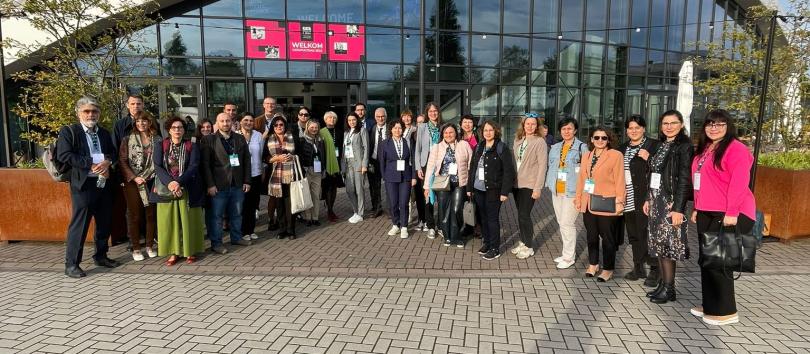
GRETA meets in Amsterdam: peer exchange on greening vocational education and training
‘We need a strong and permanent relationship between companies and schools,’ said European Commissioner Nicolas Schmit when addressing the Forum on Vocational Excellence on 26–27 September in Amsterdam. ‘Schools cannot be just suppliers to companies.’
It was the perfect introduction to a meeting that the European Training Foundation (ETF) held a day later with nearly 40 participants of the GRETA network.
GRETA is the green arm of the ETF's Network for Excellence. It supports the response of vocational education and training to the green and digital transitions. It works through self-assessment, peer learning, practice sharing and policy advice. GRETA is led by the ETF's green skills expert and country liaison officer for Ukraine, Susanne M. Nielsen.
The meeting, with centres of vocational excellence from Georgia, Denmark, Serbia, Slovenia, Ukraine, North Macedonia, Morocco, Moldova and Türkiye, confirmed that the challenges of vocational centres implementing greening ambitions are quite similar to those that plague the education sector as a whole: it is difficult to keep pace with technological and pedagogical developments, the lack of autonomy hampers innovation, financing is insufficient, teachers need continued training, and it is difficult to get companies to help.
Quoting the recently published GRETA report Greening of vocational education and training: processes, practices and policies, Nielsen said that clarity of stakeholder roles and coordination is vital for green partnerships. Insufficient mechanisms for social dialogue and skills committees can hinder stakeholder involvement, impacting the success of training programmes. And three out of four centres of vocational excellence identify a lack of knowledge, skills and competences of teachers as the largest stumbling block to preparing students for the green transition.
Trained and able ‘green’ students are needed by companies that are aware of this necessity and in need of relevant training themselves. In both cases their involvement in education is essential. In the words of Iryna Shumik, Director for Vocational Education and Training at the Ukrainian Ministry of Education and Science:
‘We need to establish more cooperation with employers and businesses.’
Judging by the points of frustration gathered from workshop participants, contact can easily be made between them but truly cooperating is a lot easier said than done. Many schools find it very hard to attain some level of constancy in their cooperation with businesses and employers.
One of the beauties of GRETA is that it helps schools to connect with peers that have solved similar challenges, often in a variety of different ways. In Amsterdam, Adrijana Hodak of the Slovenian School Centre Nova Gorica told of their journey from insular school to centre of a regional training network.
‘In the past we engaged less with companies,’ she said ‘but now Nova Gorica cooperates with no fewer than 650 employers through a scheme they call Talent Journey.’
Another excellent example from Amsterdam that also found its way into the GRETA report is the Georgian college Construct2 that came about almost entirely at the initiative of the Georgian company BK Construction.
‘The company wanted to work with insulating and earth-quake-resistant aerated concrete. It had to bring workers from Germany and Türkiye,’ said college director Tama Zakarashvili. ‘They were expensive workers, so they approached the ministry to ask for training in Georgia. They decided to work together.’
Zakarashvili acknowledged that it was rare for a company to take the initiative, let alone sustain it. The long-term benefits of cooperation between schools, authorities and companies may be obvious, but companies typically want short-term benefits and maintaining their motivation for cooperation is hard, one discussion group concluded.
To that, however, Anja Trier Wang of the Confederation of Danish Industries responded with some solid century-old Danish experience.
‘You’re all circling around this lack of interest from industry,’ she noted. ‘Well, I think they are interested, but if you ask them to spend a lot of time talking semi-abstractly about their needs, they will quickly lose that interest.’
She suggested to take a close look at the difference in communication culture between companies, government and schools and to explore the use of intermediaries when communicating with industry. This is precisely one of the ways in which GRETA intends to support its network members.
The next green webinar is on 18 October when the GRETA network meets the Danube Region Platform. The meeting will focus on examples of green regional partnerships transitioning towards a green future.
For more information on GRETA, join our online community on Open Space.
Did you like this article? If you would like to be notified when new content like this is published, subscribe to receive our email alerts.